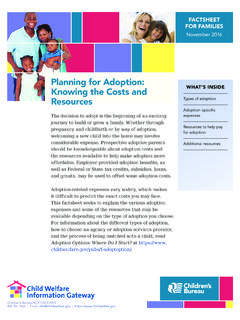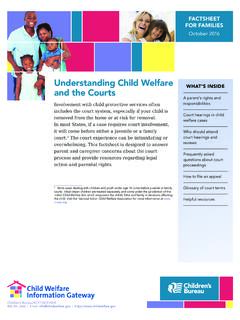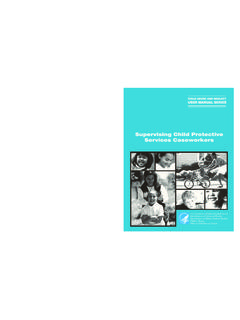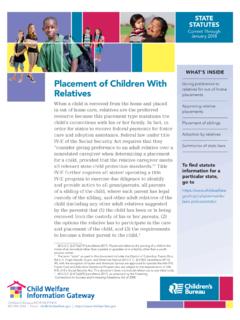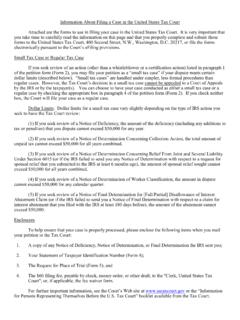Transcription of The Rights of Unmarried Fathers - childwelfare.gov
1 Children s Bureau/ACYF/ | Email: | STATUTESC urrent Through August 2017 WHAT S INSIDES tates definitions of father Paternity registriesAlternative means to establish paternityRequired informationRevocation of claimAccess to registry recordsFor more informationSummaries of state lawsTo find statute information for a particular state, go to Rights of Unmarried Fathers The parental Rights of Fathers have historically been tied to their being married to the baby s mother at the time of childbirth. However, as the percentage of births to Unmarried mothers has increased from 4 percent of total births in 1950 to more than 40 percent each year since 2008,1 there has been a corresponding rise in the number of biological Fathers who are not married to their children s mothers.
2 As society has become more accepting of nonmarital children, birth Fathers have sought to establish their Rights to their children including whether to parent their children, sustain a relationship with them, and exercise consent in the adoption According to the National Vital Statistics Reports at the Centers on Disease Control and Prevention (see ).2 Smith, S. L. (2007). Safeguarding the Rights and well-being of birthparents in the adoption process. Retrieved from uTheogeAs2011tr7ep0 Tur1he2 This material may be freely reproduced and distributed. However, when doing so, please credit Child Welfare information Gateway. This publication is available online at the past several decades, Unmarried Fathers have challenged the termination of their parental Rights under the 14th Amendment in cases in which birth mothers relinquished their children for adoption.
3 In a series of cases involving Unmarried Fathers , the Supreme Court affirmed the constitutional protection of such a father s parental Rights when he has established a substantial relationship with his child. The court found that the existence of a biological link between a child and an Unmarried father gives the father the opportunity to establish a substantial relationship, which it defined as the father s commitment to the responsibilities of parenthood, as demonstrated by being involved or attempting to be involved in the child s this publication, laws for making determinations of parentage were collected for all states, the District of Columbia, and the territories, and an analysis of this information informs the discussion that follows.
4 States Definitions of Father While there is no standard definition of father in statutes across the states, there are a number of terms that describe the status of a parent-child relationship between a man and his child. The term legal father generally refers to a man married to the mother at the time of conception or birth of their child or whose paternity has been otherwise determined by a court of competent jurisdiction. When the parents of a child are not married to one another, states use an array of terms to describe the status of a man who may be the biological father. These terms include the following: A putative father is a man who is the alleged biological father of a child but whose paternity has not been legally established.
5 An alleged father is a man who alleges himself to be, or is alleged to be, the genetic father or a possible genetic father of a child but whose paternity has not been Stanley v. Illinois, 405 645 (1972); Quilloin v. Walcott, 434 246 (1978); Caban v. Mohammed, 441 380 (1979); Lehr v. Robertson, 463 248 (1983). An acknowledged father is a man who has established a father-child relationship by signing an acknowledgment of paternity. An adjudicated father is a man who has been adjudicated by a court of competent jurisdiction to be the father of a child. A presumed father is a man who is recognized as the father of a child until that status is rebutted or confirmed in a judicial proceeding.
6 In approximately 27 states, the District of Columbia, American Samoa, and the Northern Mariana Islands, a man may be presumed to be the father of a child in any of the following circumstances:4 He and the child s mother are or were married to each other, and the child is born during the marriage or within 300 days after the marriage ended. Before the birth of the child, he and the child s mother attempted to marry, and the marriage is or could be annulled, and the child is born during the marriage or within 300 days after the marriage is terminated. He has acknowledged his paternity in writing. He is obligated to support the child, either by voluntary agreement or court order. While the child is a minor, he has resided with the child and openly claimed the child as his biological child.
7 4 The word approximately is used to stress the fact that states frequently amend their laws. This information is current through August 2017. Alabama, Arizona, Arkansas, California, Colorado, Delaware, Hawaii, Idaho, Kansas, Maine, Massachusetts, Minnesota, Missouri, Montana, Nevada, New Jersey, New Mexico, North Dakota, Ohio, Oregon, Rhode Island, South Carolina, Tennessee, Texas, Virginia, Washington, and Wisconsin use one or more of the elements listed to define a presumed uTheogeAs2011tr7ep0 Tur1he3 This material may be freely reproduced and distributed. However, when doing so, please credit Child Welfare information Gateway. This publication is available online at RegistriesBefore a man can assert any Rights with regard to the care of a nonmarital child, he must first establish his paternity of the child.
8 Many states have provisions for a father to voluntarily acknowledge paternity or the possibility of paternity of a child born outside of marriage and record the fact in a putative father registry. Approximately 25 states have established registries for this In 22 states, the District of Columbia, and the Virgin Islands, there are provisions for voluntary acknowledgment of paternity through forms that are filed with social services departments, registrars of vital statistics, or other similar of paternity or registration with a putative father registry ensures certain Rights for an Unmarried father, such as the right to receive notice of court proceedings regarding the child, petitions for adoption, and actions to terminate parental Rights .
9 In 11 states with putative father registries, filing with the registry is the primary means for establishing this right of An acknowledged father also may seek visitation with the child and usually will be required to provide financial support to the Means of Establishing PaternityIn 21 states, Guam, and the Northern Mariana Islands, a person may claim paternity to a child by filing an acknowledgment or affidavit of paternity with a In 26 states, American Samoa, and the Northern Mariana Islands, a man may consent to the placement of his name as father on a child s certificate of birth as a means 5 Alabama, Arizona, Arkansas, Delaware, Florida, Georgia, Illinois, Indiana, Iowa, Louisiana, Minnesota, Missouri, Montana, Nebraska, New Hampshire, New Mexico, New York, North Dakota, Ohio, Oklahoma, South Carolina, Tennessee, Texas, Virginia, and Alaska, California, Hawaii, Idaho, Kansas, Kentucky, Maine, Maryland, Massachusetts, Mississippi, Nevada, New Jersey, North Carolina, Oklahoma, Oregon, Pennsylvania, Rhode Island, South Dakota, Utah, Vermont, Washington, and Alabama (for births occurring after January 1, 1997)
10 , Georgia, Illinois, Indiana, Minnesota, Missouri, Montana, New Hampshire, South Carolina, Tennessee, and Alabama, Arizona, Arkansas, Connecticut, Florida, Idaho, Illinois, Indiana, Iowa, Kentucky, Louisiana, Maryland, Massachusetts, Michigan, Mississippi, New Hampshire, New Mexico, North Dakota, Rhode Island, Texas, and Virginia. of asserting his A man, the child, the child s mother, or other interested persons also may petition the court to establish a man s paternity. The court, after weighing all available evidence, will make a determination of the child s 41 states, the District of Columbia, and the Virgin Islands, a court may order the alleged father, the child, the child s mother, and any other man making a claim of paternity to submit to blood and other genetic tests as a means of determining the biological parentage of a child.
